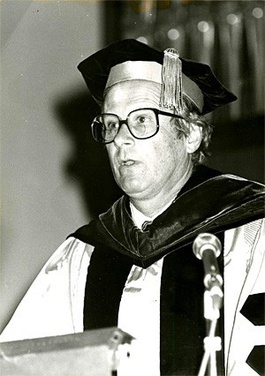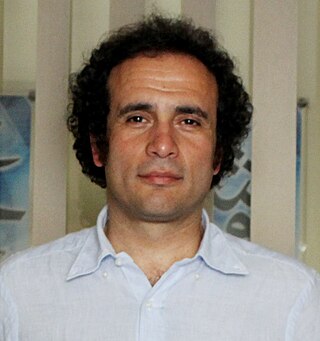John Waterbury is an American academic and former president of the American University of Beirut.
John Waterbury is an American academic and former president of the American University of Beirut.
Born in Elizabeth, New Jersey, Waterbury attended Princeton University (BA 1961), studied Arabic at the American University of Cairo (1961–62), and got his PhD in political science in 1968 at Columbia University. [1] He went on to the University of Michigan as assistant professor of political science.
In 1971 he joined the American Universities Field Staff, a consortium of American Universities, which he represented in Cairo from 1971 to 1977. His monographs for AUFS were tops among his contemporaries and he became a leading source about life and politics in Egypt for academic and government specialists for half-a-decade.. The quality of these publications led directly to his appointment at the W.Wilson School of Public and International Affairs cited below. In the winter of 1972, he was a visiting professor at the AUFS facility in Rome. During 1977-78 he was visiting professor at the University of Aix-Marseille III in France.
He was then, for nearly twenty years, professor of politics and international affairs at Princeton University's Woodrow Wilson School of Public and International Affairs. He specialized in the political economy of the developing countries with a special focus on the Middle East. He was director of Princeton's Center of International Studies and editor of the academic journal World Politics from 1992 to 1998.
In 1998, Waterbury became the 14th president of the American University of Beirut, a post he held until 2008. [2] He was the first president to reside in Beirut since 1984. During his tenure at AUB, Waterbury sought to restore the university to its long-standing place and reputation as an institution of higher learning meeting the highest international standards.[ citation needed ] AUB offered Waterbury an Honorary Doctorate during his last commencement exercises at the university in recognition of his achievements. University of Chicago Egyptologist Peter Dorman succeeded him as the 15th president of AUB on July 1, 2008.
He is now a Global Professor of Political Science in New York University (Abu Dhabi).
The American University in Cairo is a private research university in Cairo, Egypt. The university offers American-style learning programs at undergraduate, graduate, and professional levels, along with a continuing education program.

The American University of Beirut (AUB) is a private, non-sectarian, and independent university chartered in New York with its campus in Beirut, Lebanon. AUB is governed by a private, autonomous board of trustees and offers programs leading to bachelor's, master's, MD, and PhD degrees.

Robert Owen Keohane is an American academic working within the fields of international relations and international political economy. Following the publication of his influential book After Hegemony (1984), he has become widely associated with the theory of neoliberal institutionalism in international relations, as well as transnational relations and world politics in international relations in the 1970s.
Peter Joachim Katzenstein FBA is a German-American political scientist. He is the Walter S. Carpenter, Jr. Professor of International Studies at Cornell University. Katzenstein has made influential contributions to the fields of comparative politics, international relations, and international political economy.

Malcolm Hooper Kerr was a university professor specializing in the Middle East and the Arab world. An American citizen, he was born and raised in Beirut, Lebanon, where he died. He served as president of the American University of Beirut until he was killed by gunmen in 1984.
Robert Gilpin was an American political scientist. He was Professor of Politics and International Affairs at the Woodrow Wilson School of Public and International Affairs at Princeton University where he held the Eisenhower professorship.

Joel Beinin is Donald J. McLachlan Professor of History and professor of Middle East history at Stanford University. From 2006 to 2008 he served as director of Middle East studies and professor of history at the American University in Cairo.

Charles Habib Malik was a Lebanese academic, diplomat, philosopher, and politician. He served as the Lebanese representative to the United Nations, the President of the Commission on Human Rights and the United Nations General Assembly, a member of the Lebanese Cabinet, a national minister of Education and the Arts, and of Foreign Affairs and Emigration, and theologian. He participated in the drafting of the 1948 Universal Declaration of Human Rights.

Raouf Abbas Hamed was an Egyptian historian and a professor of modern history at Cairo University, until his death in 2008. He served as the president of the Egyptian Society of Historical Studies. He filled various senior academic positions, most of which in the Cairo University.

Ahmed Gamal El-din Moussa was the Minister of Education and Higher Education in Egypt, during 2011. Prior to his appointment following a cabinet reshuffle led by PM Ahmed Shafik, he was the Minister of Education. Professor Moussa is the founder and Present Managing Partner of the Arab Law Firm, founded in 2007. Professor Moussa lectures in the faculty of law of Mansoura University.
Tarif Khalidi is a Palestinian historian who now holds the Shaykh Zayid Chair in Islamic and Arabic Studies at the American University of Beirut in Lebanon.

Amr Hamzawy is an Egyptian political scientist, human rights activist and public intellectual.
The Center of International Studies (CIS) was a research center that was part of Princeton University's Woodrow Wilson School of Public and International Affairs in Princeton, New Jersey. It was founded in 1951 by six scholars who came to Princeton from Yale Institute of International Studies under the leadership of the center's first director, Frederick S. Dunn. By 1999, its stated mission was to "promote world peace and mutual understanding among nations by supporting scholarship in international relations and national development" and to "support analysis of abiding questions in international security and political economy". In 2003, the center was merged with the university's regional studies programs to form the considerably larger Princeton Institute for International and Regional Studies.

Mohamed A.M. Ismail (born 24 November 1967) was a Vice President of the Egyptian State Council, Judge at the Egyptian Supreme Administrative Court, formerly Judge at the Court of Appeal. He is a fellow of the Chartered Institute of Arbitrators (UK), Visiting Professor and PhD examiner at the British and Egyptian Universities and a lecturer at the Cairo Regional Centre of the International Commercial Arbitration (CRCICA). He is the State Prize Laureate in Academic Legal Research for 2011/2012. The Prize, which is the highest in the MENA region since 1958, was granted to him by the Arab Republic of Egypt. Ismail is a lecturer at the Arab League and BCDR-AAA. He is also a member of the Comité Française d’Arbitrage.
Farid Elias Khazen is a Lebanese politician and professor of political science at the American University of Beirut. Member of Lebanese Parliament and Ambassador since 2018.

Terje Tvedt is a Norwegian academic, author and documentary film maker.

Nassif Youssef Hitti is a Lebanese diplomat, academic, professor and the former Minister of Foreign Affairs and Emigrants.
Hilmi Murad (1919–1998) was an Egyptian economist and politician who served as the general secretary and vice president of the Socialist Labour Party. In addition, he was one of the ministers of education of Egypt.
Melani Claire Cammett is an American political scientist; she is currently the Clarence Dillon Professor of International Affairs in the Department of Government at Harvard University and the Director of the university's Weatherhead Center for International Affairs. She holds a secondary appointment in the Department of Global Health and Population at the Harvard T.H. Chan School of Public Health. Cammett's research focuses on ethnoreligious violence and the politics of development, particularly in the Middle East.
Elie Salem is a Lebanese academic and politician. He served as the deputy prime minister and minister of foreign affairs between 1982 and 1984. He was the president of the University of Balamand.